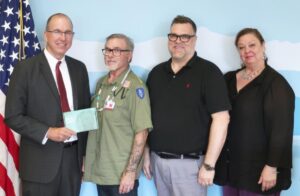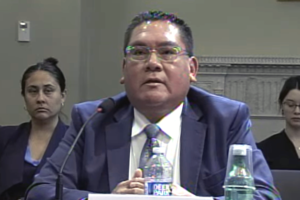
From July 25 to July 27, the MMPC and TTAG held their first Face-to-Face meetings in over three years. These meetings brought together Tribal health policy advocates, Tribal leaders, and leadership from the Centers for Medicare and Medicaid Services (CMS) to discuss recent developments and current priorities for the Medicare, Medicaid, and Children’s Health Insurance Program (CHIP) programs. The MMPC is a committee within NIHB that serves as a forum for Tribes, Tribal organizations, and those that work in Tribal health policy to share information on emerging issues and to identify agenda and action items for the TTAG meeting which follows the next day. The TTAG meeting began on July 26 at the National Museum of the American Indian and was attended by committee members from IHS service areas, as well as representatives from NIHB, the National Council on Urban Indian Health, National Congress of American Indians, and Tribal Self Governance Advisory Committee. Both meeting agendas featured a variety of presentations and discussion points, and three issues resounded throughout.
During this period of “Unwinding,” Medicaid has resumed checking eligibility and disenrolling as a result of the end of the public health emergency. At present, CMS has not publicly released disenrollment data by state. During a discussion with Daniel Tsai, Deputy Administrator and Director of the Center for Medicaid and CHIP Services, Mr. Tsai announced that general statistics on Medicaid disenrollment will be shared imminently. However, demographic data including racial and ethnic background will likely not be available for several more months. Tribal representatives also shared that there have been difficulties with certain states sharing their disenrollment data with Tribes, which has impeded efforts to combat disenrollments due to procedural missteps rather than ineligibility.
The TTAG also touched base with Mr. Tsai on the recent Four Walls grace period extension through February 2025, which permits IHS and Tribal facilities to receive Medicaid reimbursements for services provided outside of the “four walls” of their facilities. Mr. Tsai shared that this extension was intended to signal CMS’s intention to resolve the Four Walls limitation and to create time to work through the complex regulatory impact of such a change and the statutory barriers that exist.
It was also shared that CMS is considering Arizona’s 1115(a) Demonstration Waiver application to reimburse for traditional healing with the support of Medicaid and expects to have a decision before the end of the 2023 calendar year. There are three other pending waiver applications with traditional healing components: California, New Mexico, and Oregon. Arizona was the first state to submit an application to CMS back in 2016. Should it be approved, the Arizona waiver would lay the foundation for the remaining waivers.
The next MMPC Face-to-Face Meeting is tentatively scheduled for October 17, 2023, ahead of the TTAG Face-to-Face Meeting on October 18-19, 2023.




